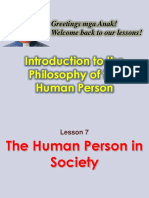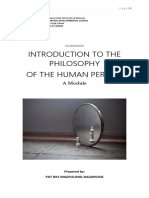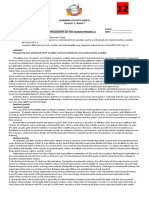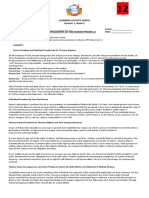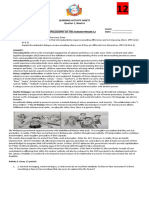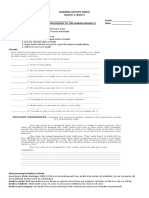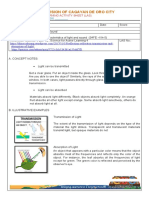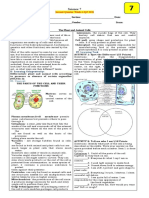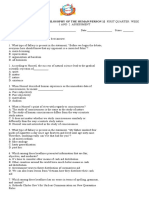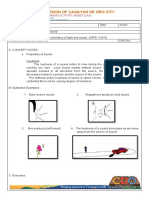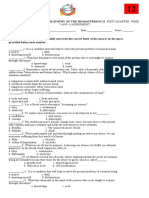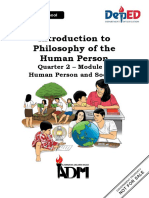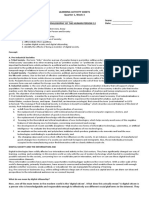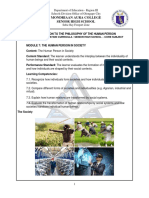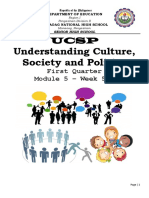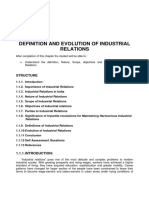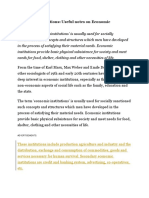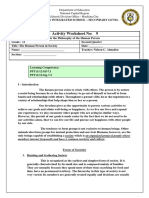LEARNING ACTIVITY SHEETS
Quarter 1, Week 3
Name: __________________________________________ Score: _______________
Grade Level: INTRODUCTION TO THE PHILOSOPHY OF THE HUMAN PERSON 12 Date: _______________
I. Types of Activity: Skills, Exercises, Essay
II. Title of the Activity: Human Person and Society
III. Learning Objectives:
The Learner is expected to:
1. identify the different types of society;
2. differentiate their qualities;
3. explain digital society and digital citizenship;
4. identify the effects of being a member of digital society.
Concept:
A. Pre-Industrial Societies
a. Tribal Society - the term “tribe” denotes a group of peoples living in a primitive setting under a leader or chief. The term
‘tribal society’ associates it to other meaning such as “primitive society” or “preliterate society.” The word ‘tribe’ has become an
important technical term which pertains to a political unit in a certain territory. The term’s use is rooted from Latin which is
associated to the political divisions or orders of the Roman empire. Tribal societies are small in scale; bound to their spatial and
temporal range of relations in terms of society, law, and politics; and possess a moral code, cult, and wide range of belief system.
b. Feudal Society - Feudalism refers to the economic, political, and social system that prevailed in Europe from about the ninth to
the fifteenth century. Due to the lack of effective centralized government during this period, kings and lords granted land and
provided protection to lesser nobles known as vassals. In return, these vassals swore oaths of loyalty and military service to their
lords. Peasants known as serfs were bound to the land and were subject to the will of their lords. One social class system or
economic form was not realized for Europe over the whole Middle Ages.
B. Industrial society is the one which uses advance technology to drive a massive production industry that will support a large
population. For example, the United States is an industrial society because a huge portion of its economy is tied to jobs that involve
machine work, like factory farming or auto-assembly plants, that has a combination of machine and human employees to produce
goods. The objective of an industrial economy is the fast and efficient manufacturing of standardized products.
C. Post Industrial Society - is marked by a progress from a manufacturing-based to a service-based economy. Post industrialization is
most evident in countries and regions that were among the first to experience the Industrial Revolution, such as the
United States, western Europe, and Japan. Daniel Bell, an American sociologist, first coined the term ‘post-industrial’ in 1973
in his book “The Coming of Post-Industrial Society: A Venture in Social Forecasting,” which describes several features of this kind of
society. Post-industrial societies are characterized by:
a. a shift from the production of goods to the production of services;
b. the replacement of manual laborers with technical and professional workers (computer engineers, doctors, and
bankers) as the direct production of goods is moved elsewhere;
c. the replacement of practical knowledge with theoretical knowledge;
d. focusing to the theoretical and ethical implications of new technologies, which helps society avoid some of the negative
features of introducing new technologies, concerning environment and energy;
e. the development of recent scientific disciplines—that involve new forms of information technology, cybernetics, or artificial
intelligence—to evaluate the theoretical and ethical implications of new technologies;
f. an emphasis on the university and polytechnic institutes which produce graduates who innovate and lead the new
technologies contributing to a postindustrial society; and
g. the changing values and norms which reflects the influences on the society. In an instance, outsourcing of manufactured
goods changes how members of a society see and treat foreigners and immigrants. Also, those individuals previously
occupied in the manufacturing sector find themselves with no clearly defined social role.
DIGITAL SOCIETY AND THE INFORMATION AGE
Digital technologies have wildly affected our interactions and activity in the 21st century. They have significantly changed our way of
learning, working and socializing. In this modern world we rely with the use of modern technology which has led to considering the
possible outcome for the society, concerning how we would take part in interaction, and how we can use these digital tools and
communication channels.
These informative societies have paved many opportunities reaching bigger audiences like never before. With a wider scale of the
world’s demography, primarily Westerners, have access to sources and technologies which enables them to connect with enough
activities whether economic, social, political, or educational. We can manipulate the phasing of learning
(e.g. free sources) or businesses (e.g. online selling) without a large sum of money used as a capital and we can share our ideas and
perspectives to the international audiences as we connect beyond.
What do we mean by digital citizenship?
Now, one of the main terms in the modern world is the ‘digital citizen’. What does this actually mean? A digital citizen is
a person who is knowledgeable and responsible enough to effectively use different social platforms in the internet. They
�often engage in useful topics and issues that will help build a better society, politics and government. If we will dig
deeper, digital citizenship might look simple. We might think that it is just about using the internet safely. However, we
also need to consider and understand that this citizenship can get complicated, especially if we are going to criticize and
show interest in sensitive topics as we start to become a digital citizen, using digital media to actively participate in
society and politics.




